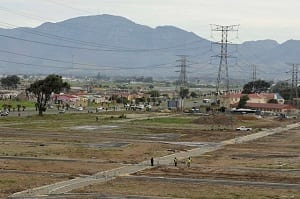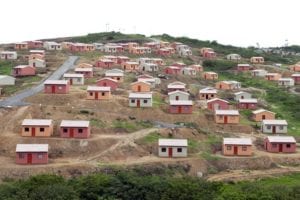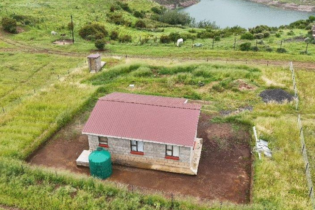
The City of Cape Town’s Gugulethu/Nyanga Infill Housing Project.
SA faces an acute shortage of affordable housing in its main urban areas. This was estimated at approximately three million housing units in 2014 and as a result, more than 2,600 informal settlements have sprung up around 70 of SA’s major urban areas to date.
When Human Settlements Minister Lindiwe Sisulu spoke at the inaugural National Human Settlements Conference earlier in October, she said the global crisis on housing has continued with the main issue being a shortage of affordable housing.
The Mayor of London also highlighted the same issues earlier this year. “That London, being one of the oldest cities in the modern world, is still in the grip of a housing crisis, then you will understand the enormity of the problem still ahead of us,” Sisulu said.
She was certain that the African continent was very determined to find solutions specific to its housing problems.
Delegates from around the globe attended the conference and helped address matters. Participation and “sound advice” was contributed by university professors and housing experts from countries such as the United States, Germany, Nigeria, Colombia, Brazil, Canada and the United Kingdom, Sisulu said.
The following commitments to research were made at the conference:
- The illegal sale and real occupants of government-funded houses
- Housing subsidies revolving within single households
- Quantification of housing demand from 40 years of age and above
- Demographic profile of ownership patterns in the property management sector
- Patterns of financed-linked housing allocation in the middle and upper-income levels of the residential property market
- Extent of rental accommodation need in university towns and devising appropriate responses
Challenges faced by housing sector
Despite current financial support towards housing programmes, the housing sector remains in urgent need of further assistance.
The Department of Human Settlements said decisive interventions have been made to address the informality and housing inadequacy, as well as other related issues of unemployment, poverty, lack of unsuitable land etc.
The department also said the pace at which science, technology and building innovations were being embraced have been too slow. These factors have added pressure “on the conventional methods of housing delivery and human settlements development,” the department said.
Spheres including members of the public, businesses, organisations and volunteer groups, to name a few, possess skills, resources and systems which are critical for a sustainable human settlement development, the department said. It added that some municipalities were “lacking” in this regard.
Aiding housing development
The African Development Bank Group (AfDB) has approved a loan of R570 million to help finance affordable housing programmes across SA. The bank said the loan was to help SA’s lower-middle income earners who currently have “limited opportunities to access affordable mortgages”.
“It will also consolidate the growth of a strong affordable housing sector within South Africa,” the bank added. The aim of the loan was to also help reduce fiscal pressures on the South African government.
A further R1.82 billion has been raised by the National Housing Finance Company, the Old Mutual Group and Futuregrowth. The AfDB said it has plans to offer more than 4 000 affordable mortgages to SA’s lower-middle income earners.
The bank said the intervention will generate other significant benefits including moving between 2,500 and 6,500 people out of informal settlements and will create about 3,250 permanent jobs, mainly for the youth.
“Overall, financing 4,386 affordable housing units is expected to generate over 10,000 jobs, including 950 to 1,296 direct jobs for women,” the bank added.
“This is an excellent example of how we can intervene in middle income countries, such as South Africa, with developed financial systems, and generate an impact through the private sector on the quality of life of lower middle income earners” Frannie Leautier, AfDB’s senior vice-president said.








